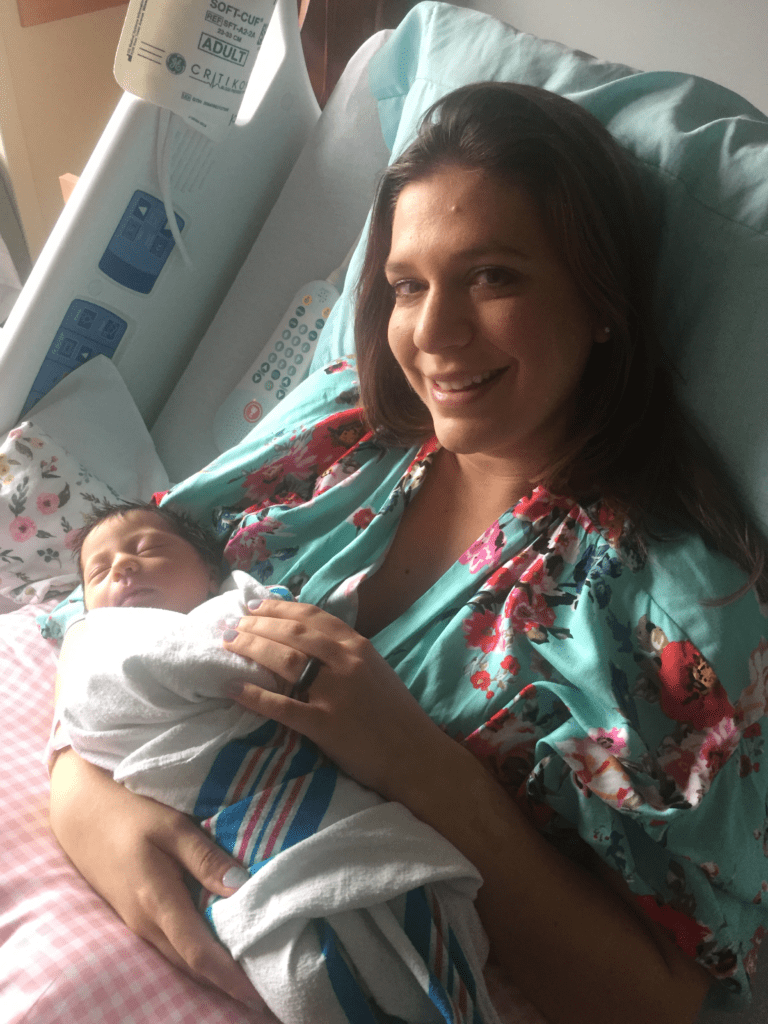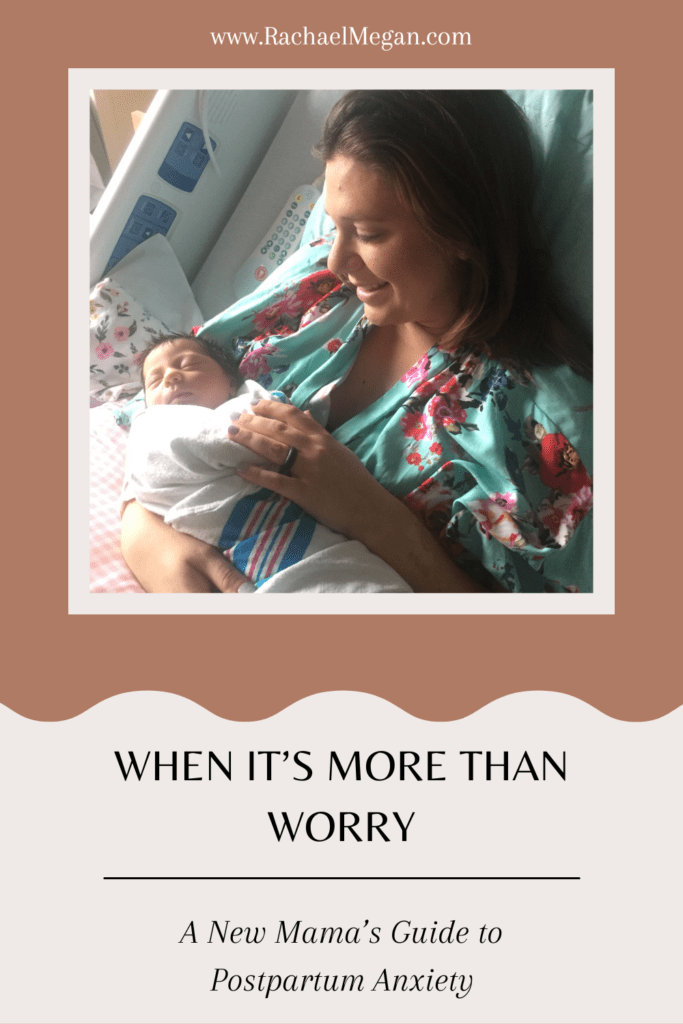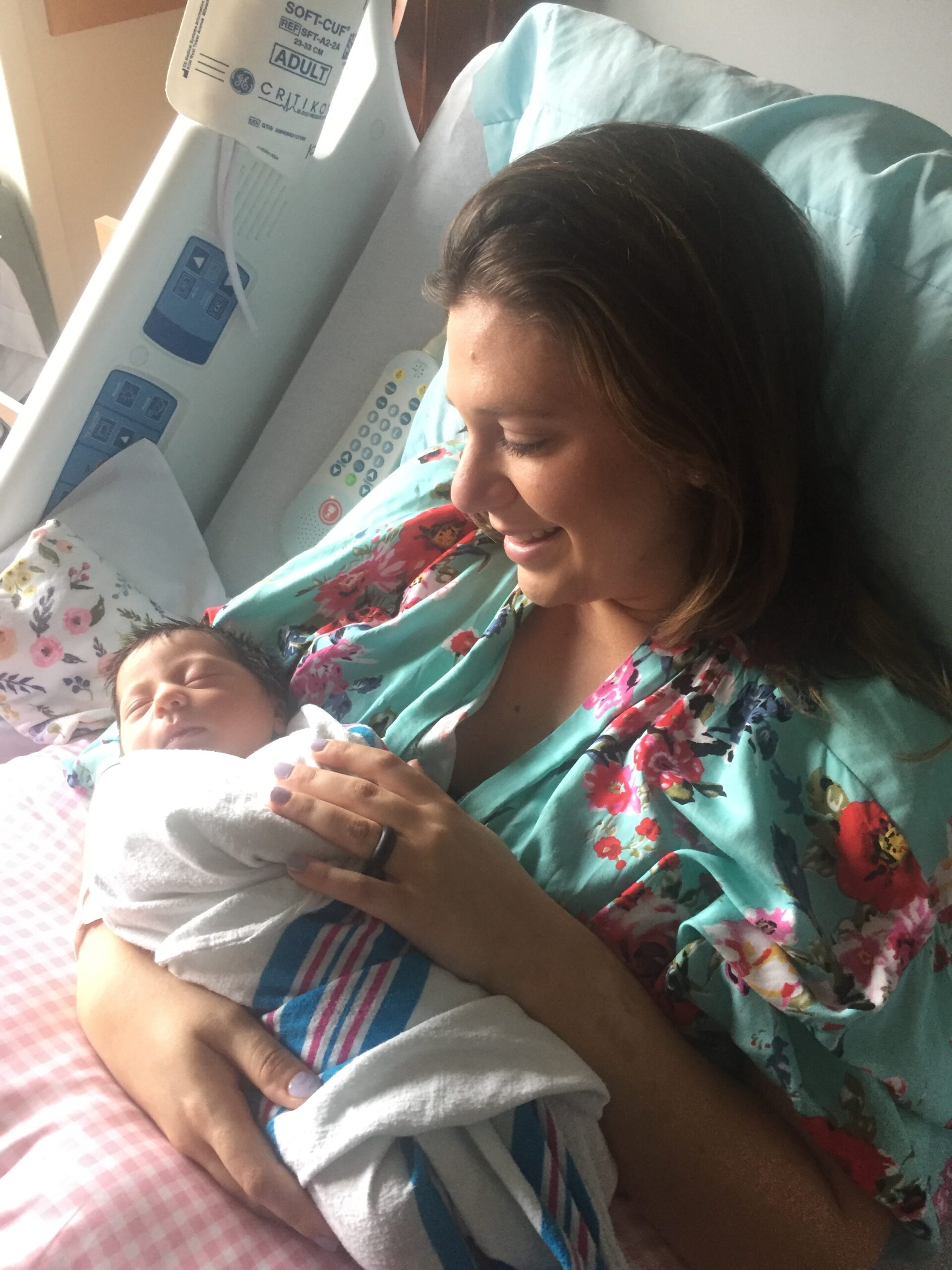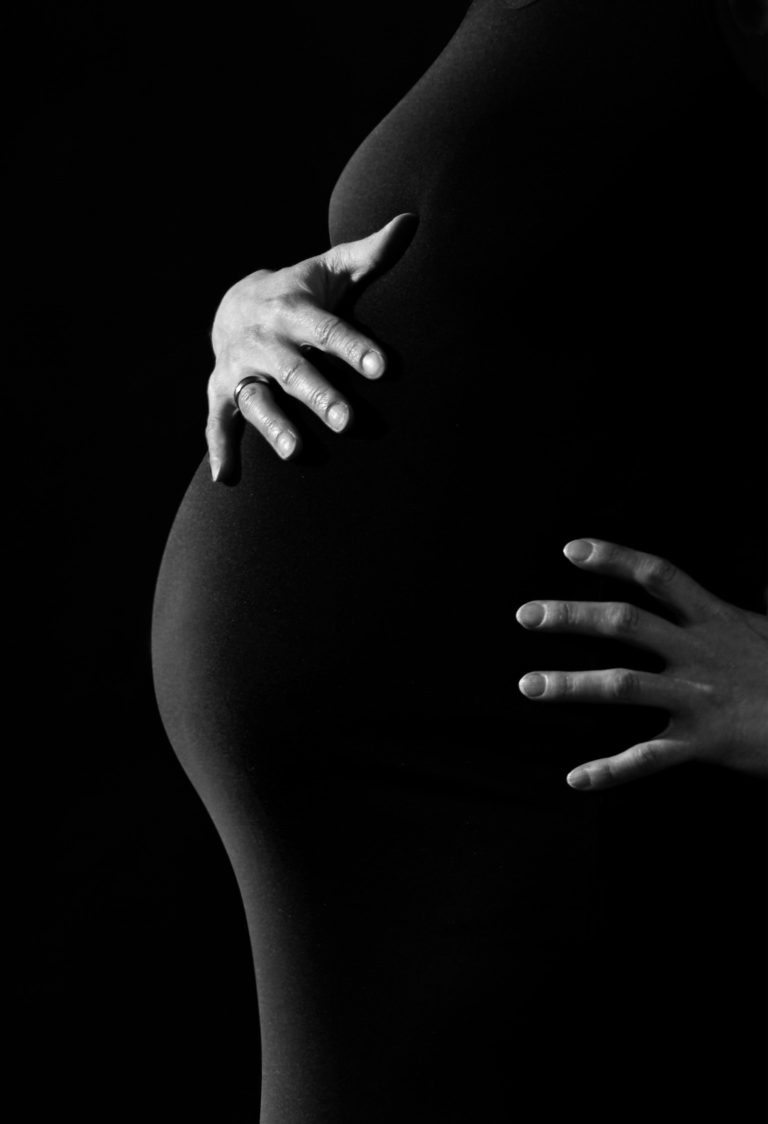When It’s More Than Worry: A New Mama’s Guide To Postpartum Anxiety
*TW: Mentions of my experience with postpartum anxiety. If this is something that would be unsettling or upsetting for you, please leave this post and take care of you.
**This post may contain links that I am not affiliated with in any form and were simply included for educational purposes only.
I still remember the day like it was yesterday. My daughter was a mere three-days-old, and my husband and I were alone with her in our hospital room. Despite the flurry and excitement a new life can bring, as well as an unexpected C-section three days before, this particular moment was quiet. We hadn’t had any visitors that afternoon aside from the occasional nurse. Everything had this special peace about it.
The stillness of the moment unleashed a rush of emotions within me that took me by surprise. The doors to my heart burst wide open; too full of love and gratitude to be contained. Yet, when those doors sprung open, welcoming the joy of the moment, they unknowingly let in an unwanted guest: fear. Outside our sixth floor window, it was as if the sky was playing off the emotions within me. The beauty of the blue sky was interrupted by rain clouds that suddenly burst open. As the rain began to fall, so did my tears.

It was in that very moment that I remember thinking, “Am I going to be afraid, everyday, for the rest of my life?” Looking at my husband, I asked him how we were ever going to protect our baby girl from all of the terrible things in this world. As I sat taking in her every detail, all I could think about was keeping her safe. I knew we would soon leave our little cocoon within the hospital. The thought of leaving terrified me; thinking of taking her out into the big, wide world. Suddenly, the world outside those walls felt foreign. Looking back, knowing what I know now, I can so clearly see the beginnings of postpartum anxiety.
What is Postpartum Anxiety?
According to this article (see Baby-Postpartum Health-BabyCenter), postpartum anxiety can be defined as worrying that is “excessive and disruptive to your daily life.” Unlike postpartum depression, which is often characterized by overwhelming sadness, postpartum anxiety is when a parent is overwhelmed with fear or worry for their child’s well-being. While a little worry is perfectly normal for any new parent, someone with PPA is consumed by it. Their level of anxiety feels out of control and begins to impact the way they go about their life.
Looking back at my experience, I would define postpartum anxiety as a tiny, invisible monster. This monster lives on your shoulder and whispers worst-case scenarios into your ear day and night. No matter how hard you try to silence it, it continues incessantly; causing you to question all that you know to be true. It’ll leave you doubting your faith, and it will rob you of your confidence as a mother. This monster will bully you into double (and then triple) checking that your child is breathing while she sleeps. It lies and tells you that only you, not even your husband, can take care of the baby long enough for you to even take a shower. It fools you into believing that at any moment, your phone at work will ring because something terrible has happened to your child; leaving you paralyzed to complete the task at hand.
What Do You Need to Know About PPA?
Unlike postpartum depression, postpartum anxiety isn’t as widely discussed, but it can be just as devastating. It may also be just as common. As a new mom, you need to know what it is, along with what symptoms to watch for, in order to advocate for yourself.
As a first time mom, I knew what to watch for when it came to postpartum depression (PPD). In my case, I wasn’t depressed. I wasn’t suffering with extreme sadness or contemplating hurting myself or my child. I wasn’t dealing with what I knew to be PPD. What I was doing was checking my child’s breathing obsessively because I was terrified of SIDS (Sudden Infant Death Syndrome) or asphyxiation. I was Googling everything, from safe sleep guidelines to what color her bowel movements should be. While every new mother has questions, I was convinced that something was wrong with my child or I was doing something wrong as her mother.
When it came to my daughter’s well-being, I was overwhelmed with worry; however, I kept it to myself. I wasn’t sure how to describe what I was going through. I have always struggled with anxiety at some level, and worry is naturally a part of any new parent’s life; although, looking back, I now know that the level of worry I was dealing with was extreme. Then, late one night, while scrolling through Instagram, I read about another mother whose symptoms mirrored mine. She mentioned two words: postpartum anxiety. I had never heard of this disorder until that moment. After that, I began learning more about PPA, and eventually, it lead me to seek help.
How to Know If You Have PPA
While a little worry is normal for any new mama, when the worrying becomes constant and begins to impact your daily life, you may be suffering from PPA. According to these articles (see First Year-Postpartum Health & Care-What To Expect and Baby-Postpartum Health-BabyCenter), symptoms of PPA can include:
- intrusive thoughts that are difficult to dismiss
- an inability to focus and difficulty concentrating
- irritability
- a sense that something bad is about to happen or feeling on edge
- excessive worry about the well-being of your child
- disruptions in sleep or appetite
- restlessness
- physical symptoms, such has dizziness, nausea, stomach aches, and heart palpitations
- being overly cautious or controlling around people/situations that are not dangerous
Intrusive Thoughts-Unwanted thoughts that come to your mind without warning, at any time. They are often repetitive and can be very distressing.
If you suspect that you, or someone you love, has postpartum anxiety, the next step would be to reach out to a trusted provider (your family doctor, OBGYN, or mental health provider.) They would be able to have a more in-depth discussion with you regarding your particular symptoms. They would also be able to point you in the right direction when it comes to treatment options.
PPA and Me
Intrusive thoughts were my most prevalent and distressing symptom, even though I didn’t know what they were called at the time. I didn’t understand why these terrible thoughts would randomly enter my mind. It wasn’t until after I sought out help that I learned what an intrusive thought was. Some examples of these thoughts I had included:
- “What if I have a seizure while taking my daughter for a walk and lose control of her stroller?”
- “What if I trip and fall down the stairs while carrying my daughter?”
- “My phone is going to ring any minute with the news that something terrible has happened to my baby.”
Remember that monster analogy from earlier? The worst-case scenarios it would whisper? Those are the intrusive thoughts. It didn’t matter that I had no history of seizures. The monster planted the idea that it could happen along with the terrible image of her stroller rolling into a busy road. It bullied me into taking each step down the staircase one-by-one, very slowly, or even by way of sitting down; scooting from step-to-step. It mocked me for leaving my child to return to work; whispering lies that she was in danger despite her being completely loved and cared for by a trusted adult.
Once I knew what PPA and intrusive thoughts were, I felt like I had my power back. The simple act of being able to name what I was going through helped me to feel in control again. It also helped guide me towards which course of action to take to get myself the help I needed.
Tips For Dealing With Postpartum Anxiety
One of the most important things to know about postpartum anxiety is that it is treatable. With the correct diagnosis and treatment plan, you can and will get better. The first step, and most important, is to ask for help. According to this article from Healthline, treatment options include:
- A referral to a mental healthcare provider who has experience treating new moms with mood disorders.
- CBT (Cognitive Behavioral Therapy) or Talk Therapy has been shown to help with cases of mild to moderate anxiety, while medication may be needed for more severe cases.
- A mental healthcare provider may also walk you through other natural practices, such as mindfulness training and relaxation exercises.
- Talk with your spouse, or a trusted friend or family member about what you’re experiencing.
- Prioritizing self-care, such as exercise, drinking enough water, eating nutritious foods, and connecting with other mothers can also help in recovery.
If you need help immediately, and are having thoughts of harming yourself or your child, contact the 988 Suicide and Crisis Lifeline by calling or texting 988.
My Road To Recovery
While I plan to share more about my recovery process in a later post, I wanted to touch on it briefly here, in case it would help another mother. What ended up having the biggest impact for me was talk therapy. While asking for help can be really hard, it had reached a point where I couldn’t continue operating at the level I was on. My anxiety was spiraling and impacting other areas of my life. I finally sat down with my husband and admitted I needed help. Talk therapy was something that helped me tremendously in the past, and I had reached a point where I felt it was necessary again.
Through the recommendation of a close friend, I was able to connect with a wonderful counselor. She specializes in women’s mental health, and has had experience working with mothers in the postpartum period. Their practice focuses on mindfulness-based cognitive therapy, one of the treatment options listed above, and it helped me greatly. As I mentioned earlier, my most distressing symptom was the intrusive thoughts. Through this therapy, I learned how to break those negative thinking patterns and stay more present-minded.
Frequently Asked Questions About PPA
Resources
If you would like to look up more information regarding PPA, below is a roundup of the websites I referenced in this article, as well as a link to the site for Postpartum Support International.
- https://www.whattoexpect.com/
- https://www.babycenter.com/
- https://www.healthline.com/
- https://www.goodrx.com/health
- https://www.postpartum.net/
The Last Thing You Need to Know About PPA
If this was your first time learning about postpartum anxiety, and like me, you identified with the information shared, please know that you are not alone. You do not have to suffer in silence, and postpartum anxiety IS treatable. What you are going through isn’t your new way of existing now that you’re a mom. It will get better. The hardest step is taking that first one to ask for help.
If this article helped you in any way or if you have anymore questions regarding my personal experience with PPA, please leave a comment below. We’re in this together, Mama!
Sincerely,
Rachael Megan






